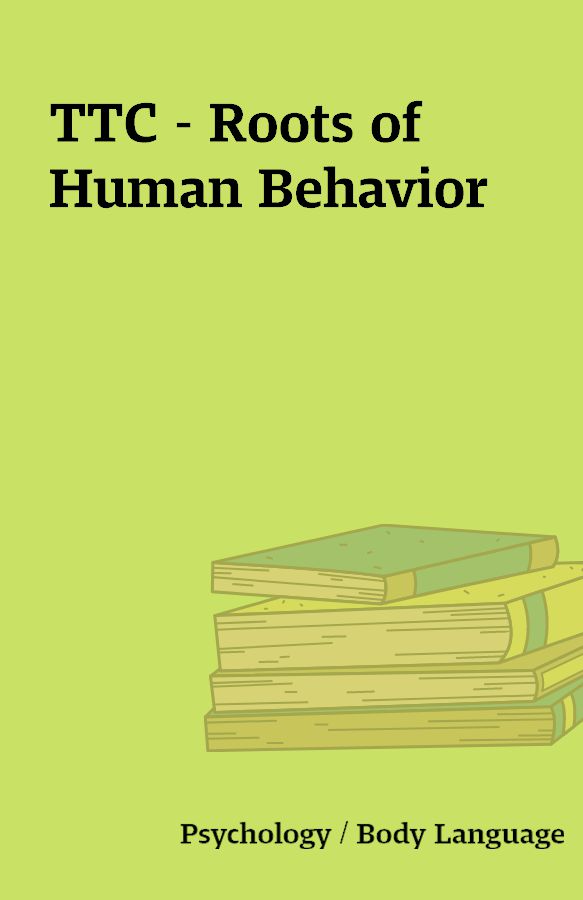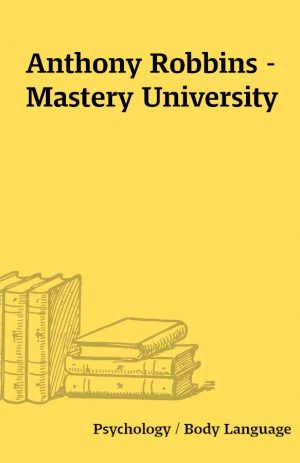TTC – Roots of Human Behavior
TTC – Roots of Human Behavior
[14 video (avi) + 1 ebook (PDF)]
Description
TTC – Roots of Human Behaviorhttp://www.teach12.com/ttcx/CourseDescLong2.aspx?cid=168Course No. 168 (12 lectures, 30 minutes/lecture)Taught by Barbara J. KingThe College of William and MaryPh.D., University of OklahomaVideo: Xvid 528×384 29.97fpsAudio: MPEG Audio Layer 3 48000Hz stereo 128KbpsWhile human history is usually studied from the perspective of a few hundred years, anthropologists consider deeper causes for the ways we act. In this course, anthropologist Barbara J. King uses her wealth of research experience to open a window of understanding for you into the legacy left by our primate past.These lectures look for the roots of human behavior in the behavior of other primates: monkeys, apes, and human ancestors.In these lectures, you explore such questions as:* Are language and technology unique to humans?* Have human love and loyalty developed from emotions of our primate cousins?* Do the ways in which human males and females relate to each other come from our primate past?* Have we inherited a biological tendency for aggression?* How much of our behavioral, cognitive, and cultural identity have we inherited from our closest living relatives?* How can the study of monkeys and apes lead us to a fuller picture of who we are?As human beings who value our advanced technologies and complex cultures, we are accustomed to viewing ourselves as unique. Since the 1960s, however, when dramatic new findings about monkeys and apes burst onto the scene, it has become increasingly clear that many of the behaviors that we have taken as distinctly human were present before human evolution began.Thus we look back to a forest in Africa, millions of years ago, when a generalized great ape ancestor split into distinct lineages, then evolved and divided further to create our closest living relatives, and human beings.Elsewhere, in Asia and the New World, other anthropoid primates followed their own evolutionary course, separate from the human lineage, yet still connected in important ways. From this vantage point, we can see the vast and vibrant range of species to which we are related, not just anatomically, but behaviorally.An Expert as Your GuideDr. King has spent 22 years on the cutting-edge of biological anthropology, not just in the academy but on the plains of Kenya at Amboseli National Park, where she studied baboons, and as a researcher of lowland gorillas at the Smithsonian’s National Zoological Park.She has taught at The College of William and Mary since 1988 and has won teaching awards, including William and Mary’s Thomas Jefferson Teaching Award and the Virginia State Council of Higher Education’s Outstanding Faculty Award. The recipient of a Guggenheim Fellowship, Professor King has published three books on anthropology and is writing a fourth.Her perspective is scientific, and the lessons she shares in this course are drawn from an analysis of scores of case studies, the researcher’s stock in trade. She is careful to offer persuasive arguments, but avoids definitive conclusions unless they are solidly warranted. Her belief is that, for the scientist, ideas are to be tested, evaluated, sometimes discarded, sometimes revised, and always to be refined by the latest data.”Dr. King explores commonalities shared by nonhuman anthropoid primates and humans without overlooking the great degree of behavioral diversity within and across species… Each of the half-hour lectures builds upon the knowledge base of the previous lectures,” reports The American Journal of Primatology.Biocultural BeingsOne main tool of the biological anthropologist is the biocultural approach. Using this perspective, humans are analyzed both as products of their evolutionary past and as architects of their own current cultural contexts.”Further,” states Dr. King, “humans are seen as one type of anthropoid, a grouping of organisms that includes monkeys, apes, humans, and human ancestors. In this comparative approach, the behavior of anthropoids is broadly assessed to identify possible ‘roots of human behavior.'” As anyone familiar with the “nature vs. nurture” debate knows, we have long considered what aspects of human behavior are innate and which are produced by our cultural environment.This concept is a central theme of this course: that all anthropoid primates, including humans, are indeed biocultural beings. We are neither biologically determined, nor tabulae rasae, upon which culture is imposed. Rather, identity emerges out of a jointly active and dynamic process.Applying this model to apes and monkeys has revolutionized our appreciation of their complex and evolving natures.For example, we now know that:# Infant baboons are active in finding out what foods to eat and how to prepare them.# Recent observation of an African chimpanzee youngster suggests that it invented a “doll” to keep itself company.# Gorillas that do not use tools in the wild have, in captivity, invented tools to increase their access to food.These are only a few of the striking examples of how great apes and monkeys spontaneously adapt in new and different ways to prove that biology isn’t necessarily destiny.The Anthropomorphic DebateAn enigmatic question lingers: Just how alike are we to our anthropoid relatives? Some critics have argued that we are too quick to project human qualities onto animals, especially the great apes. Dr. King tackles this debate head-on and examines many challenging questions and issues:* Male orangutans have been known to engage in forced copulation with unwilling female partners, and male gorillas sometimes commit infanticide to acquire a new, fertile mate. Can we properly understand these acts as rape and murder? What does this tell us about a biological basis for male aggression in humans?* Well-known primate researcher Jane Goodall observed that when Flo, a female chimpanzee, died from old age, Flo’s youngest child wasted away and eventually died. Is her claim that the infant died of “grief” viable?* We know that on rare occasions chimpanzees slowly demonstrate feeding and tool-using techniques when infants are present. Is this teaching?The Human Equation: Our Place in Today’s WorldProfessor King’s thorough and critical examination of our diverse primate roots allows you to see our human family in an entirely new light.Course Lecture Titles01. The Four Facets of Anthropology02. Social Bonds and Family Ties03. The Journey Away from Mom04. Males and Females—Really So Different?05. Sex and Reproduction06. Tool Making—Of Hammers and Anvils07. Social Learning and Teaching08. Culture—What Is It? Who’s Got It?09. Dynamics of Social Communication10. Do Great Apes Use Language?11. Highlights of Human Evolution12. Exploring and Conserving a Legacy
You must be logged in to post a review.






Reviews
There are no reviews yet.